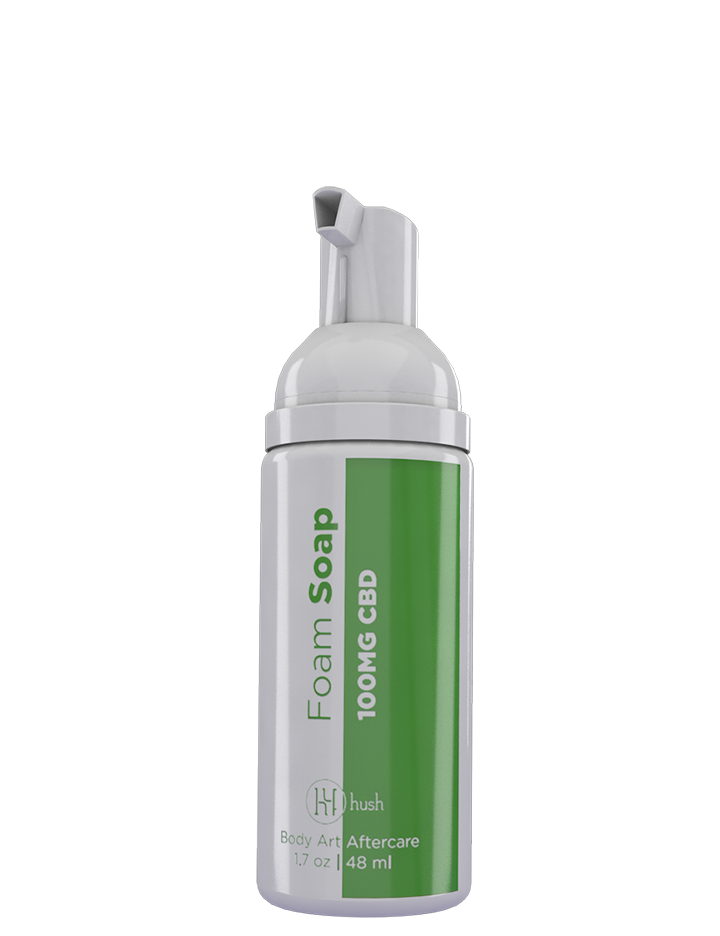There are a lot of myths and misconceptions about color tattoos on dark skin. Some people might not even know it’s possible to do a full-color tattoo on someone with a very deep complexion. We’re here to clear up a lot of misinformation.
If you have dark skin and your heart is set on a color tattoo, you can absolutely get what you want. You may need to make a few minor adjustments to account for the pigment in your skin, but there’s no reason to stay away from color.
Here’s what you need to know about color tattoos on dark skin and how to find an artist who’s right for the job.
How Does Tattoo Ink Work?

When you get a tattoo, it looks like the ink is being permanently drawn into the surface of your skin. That’s not exactly what’s happening. A tattoo needle penetrates to a depth of about two millimeters below the surface of your skin.
Let’s eliminate an important myth about skin depth while we’re here. Somehow, someway, a rumor was started that dark skin is thicker than light skin, making it more difficult to tattoo.
That’s bullshit. Skin is skin. Here’s proof: there are no statistically significant differences in skin thickness between different ethnicities, and a two-millimeter depth is suitable for everyone.
The tattoo needle deposits the ink beneath the surface layer of the skin and into the dermis, where it’s trapped and held in place by skin cells and repair cells. The top layer of your skin, called your epidermis, heals over the top of your tattoo.
Your epidermis will produce cells called melanocytes, which will then produce melanin. Your epidermis will grow and repair itself, taking on its natural hue.
If you have naturally light skin, your body produces very little melanin. You’ll see the tattoo right through your epidermis. If you have dark skin, your body produces a lot of melanin. The melanin can make it difficult (or even impossible) to see some colors of your tattoo.
Can People With Dark Skin Get Color Tattoos?
People with dark skin can absolutely get color tattoos. Some colors may not translate as well through very deep skin tones, but plenty of shades will show through beautifully.
Earth-toned shades and jewel-toned shades translate perfectly to darker skin. Some shades of green, yellow, and even white ink can pop with lively contrast. Most artists can modify any tattoo to work perfectly with a darker skin tone.
How Does Skin Tone Affect Tattoos?

Pastel shades pop on light skin tones because the skin is nearly translucent. Fair skin acts as a high-contrast background, whereas dark skin won’t do the same thing. Pastel colors may not translate well on dark skin tones, especially in large amounts.
You may be able to add in a few pastel accents or highlights, but you shouldn’t choose a pastel palette for the basis of your whole tattoo. Your best bet will always be strong colors.
Rather than lilac, opt for amethyst. Emerald will work better than mint, and cobalt will translate better than sky blue. Deeper shades provide a brilliant contrast against the canvas of dark skin.
Color Theory for Tattoos on Dark Skin
Let’s talk about something every tattoo artist should know, and every client with melanin-rich skin needs to hear loud and clear: color theory makes it possible to craft a bold tattoo on dark skin.
The Previous Approach to Color on Dark Skin
Back in the day, the standard advice floating around shops was: keep it simple and stick to black ink. The whole “only black ink works” myth is just a simplified version of a real design principle: prioritizing contrast.
Whether you’re working on paper, canvas, or skin, if you don’t have contrast, you don’t have clarity. It’s not about skin tone. It’s about value, saturation, and understanding how pigment behaves once it’s healed under melanated skin.
When tattoo ink color palettes were limited, it was safer to abide by the contrast theory. Now that some companies make hundreds of colors of ink in different hues and values, there are far more options.
Skin as a Filter
Think of the skin like a tinted window. When you get a tattoo, the ink doesn’t sit on the surface. It lives under a few layers of skin. If your skin tone is medium to deep brown, those layers act like a warm-toned filter. So the color that went in? It’s not necessarily the color you’ll see once it heals.
There are colors that will be nearly invisible beneath the filter of dark skin, like pastel shades. There are plenty of colors that can exist harmoniously through the filter of dark skin.
Red, Green, and Black as Standout Colors
If you’ve ever seen red or green pop like a dream on dark skin, you've seen the effects of saturation and complementary contrast at work. Red and green are intense, saturated hues that don’t get dulled out as easily by brown skin tones. They sit a few “slices” of the color wheel away from the golden orange zone where brown generally lives, so they stand out.
Black is still a staple because, let’s be honest, it punches hard and stays sharp. When used smartly, color doesn’t have to take a backseat to a black outline. This is true for any tattoo on any skin tone.
Blue and Violet Can Be Challenging
Blue-violet, primary blue, and cool-toned purple are beautiful in the bottle. That’s because brown is technically a deep orange in most cases. Orange and blue are opposites, and they can muddy each other out quickly.
That doesn’t mean you can’t ever use purples or blues. It just means you need to pick richer, warmer versions. Deep navy and red-based purples, like plum colors, are less likely to look dull.
The Difference Between Fresh and Healed Ink
Ink looks incredible when it’s fresh. It's brighter and bolder before it settles beneath the skin. You don't really get the full picture for a few weeks when your skin heals over your tattoo.
Great artists can anticipate the effect of skin tone on ink color. They should know how to adjust their palette to accommodate the effect that healing will have on the overall aesthetic of the tattoo.
Most Colors Can Work (With a Little Adjustment)
Reds, greens, golds, and high saturation warm tones will work on most people with dark skin. Blues and purples are trickier, but not impossible. When you're envisioning your next tattoo, hold a color wheel to your skin tone and choose colors that are complementary and similar in hue without opposing your skin tone.
You can work with your artist to select modified colors that will work with your specific skin tone and undertone. There may be a few that won't work as well, but most jewel tones will pop.
A Tattoo Can Provide Contrast for Itself
Black and white tattoo ink work to provide contrast within a tattoo. Using a great outline or setting a tattoo on a darker background can create an opportunity for brighter colors to really shine on brown skin tones.
An experienced tattoo artist may be able to help you modify your tattoo idea to incorporate more opportunities for contrast. A few small changes can make the colors in your tattoo appear more vivid and bold.
This might mean that dainty, lineless, or watercolor tattoos are off the table. It all depends on what you want, your skin tone, and the size of the tattoo you’re trying to get. Your artist can talk you through the limitations of your idea and create a plan to give you what you want.
Consider a Color Test Tattoo
If you have dark skin and you’ve never had a tattoo, you might be a little worried about committing to something. You won’t know how the color will look until it’s tattooed on you.
If you don’t like it, it’s a little too late to change your mind. That’s why many tattoo artists are willing to give you a color test tattoo.
A color test tattoo is a small series of dots. They’re usually easy to cover with a larger tattoo. Your tattoo artist can tattoo dots of many different colors in the potential tattoo area.
Depending on what you want and where you’re going to get it, the artist might be able to place those dots in areas covered by black ink.
After a few weeks, you’ll know exactly what those ink colors will look like once your skin has healed over them. If you don’t like how a particular color looks or if it doesn’t show up very well, you can swap it out for a better alternative. Your tattoo artist can place the finalized design over the color test tattoo dots to hide them.
Are There Tattoo Artists for People of Color?

If you’re having a tough time finding a tattoo artist you feel comfortable with; you’re not alone. Many people of color are turned away by tattoo artists, with some even dismissively declaring that it isn’t possible to do a color tattoo on someone with dark skin.
We’ll be blunt: that really sucks. It’s absolute garbage that a tattoo artist wouldn’t bother to discuss a color tattoo with someone with brown or black skin.
There’s another way to look at it. If a tattoo artist says that it isn’t possible to do a color tattoo on someone with dark skin, they’re a bad tattoo artist. That’s not someone you would want to tattoo anyone under any circumstances.
It means they don’t understand how depositing color works and how melanin can affect the way a tattoo appears. There’s also a bit of an industry problem.
Many tattoo ink companies show their products primarily on people with light skin, which inadvertently gives the impression that the inks are intended for light skin. When artists buy inks from a company, they don’t know how those inks will work on various skin tones.
Some tattoo artists would love to do more color tattoos on people with dark skin, but they aren’t sure how they’ll look when they’re healed. They’ll turn clients away because they’re afraid they’ll create a tattoo that the client isn’t happy with, and no artist wants to be responsible for bad work.
Plenty of experienced artists have a full grasp of how color tattoos work on dark skin. They’ve practiced and mastered their craft.
They know what to do to make colors stand out on dark complexions and even how to adjust the shades of their inks to create the perfect contrast. They’re out there, they’re the best at what they do, and they’re worth searching for.
How Do I Choose a Tattoo Artist?
Choose a tattoo artist that has experience working with clients with black and brown skin. Tattoo ink requires precise placement for clarity and vibrancy.
Tattoos that aren’t set at a perfect depth may not look terrible on people with less melanin, but these mistakes can be very noticeable on people with dark skin. You need to choose someone who knows what they’re doing.
When looking through an artist’s portfolio, please pay close attention to their clients with dark skin. Tattoo artists (like anyone else building a professional portfolio) will only show off the best photos possible.
See if they’ve tagged the people who got the tattoo. If you have an opportunity to see how well those tattoos aged, that will tell you everything you need to know.
It’s normal for tattoos to fade a little bit as they settle in, but it should still be clear what they are. The colors shouldn’t look muddy. They also shouldn’t bleed together unless the design of the tattoo incorporates a bleeding effect, like a watercolor tattoo.
It never hurts to ask people for recommendations. If you see someone with a skin tone similar to yours with a beautiful tattoo, tell them how much you like their tattoo and ask them who they went to.
There’s a good chance that person understands the struggle of finding a great artist with experience tattooing on dark skin, and they’ll be happy to point you in the right direction.
How Do I Care for Color Tattoos on Dark Skin?

You have your tattoo. It’s beautiful. You love it. You’re stoked. Now it’s all over, right? Think again. You now have to maintain this lifetime commitment.
The aftercare process for all tattoos is essentially the same, no matter your skin color.
It’s important to give your tattoo time to heal properly. Don’t pick at it or scratch it.
Follow your tattoo artist’s aftercare instructions regarding cleansing and moisturizing your new tattoo. You may need to keep it covered for the first few days and avoid getting it wet.
There will be times when the desire to itch your new tattoo will be absolutely maddening, but you have to stick it out. Our healing spray works to prevent tattoos from getting infected while they heal. It also contains lidocaine, which can numb the itchy sensation.
After completely healing your tattoo, it’s important to keep it moisturized and protected from the sun. If your skin gets dry, it may change how your tattoo looks. The changes aren’t permanent, but you probably don’t want to walk around looking like you got a bad tattoo. It’s beautiful under there. Just focus on keeping the skin soft and getting rid of the dead cells.
Sunscreen is also very important. People with darker skin tones are less likely to get a sunburn, but unprotected sun exposure isn’t healthy for the skin. They're still happening even if you can’t see visible signs of sun damage.
In addition to damaging your skin, the sun can also cause your tattoo ink to fade. Slapping on some broad spectrum SPF 30 before you leave the house can save you a ton of money on tattoo touch-ups.
Conclusion
Getting a tattoo on dark skin can seem daunting, but there are ways to support the process. Finding the right artist, doing a color test, and choosing colors based on your skin tone can set you up for success.
And don’t forget to use products to soothe and support the healing process along the way with HUSH!
Sources:
Caliper-measured skin thickness is similar in white and black women | PubMed




